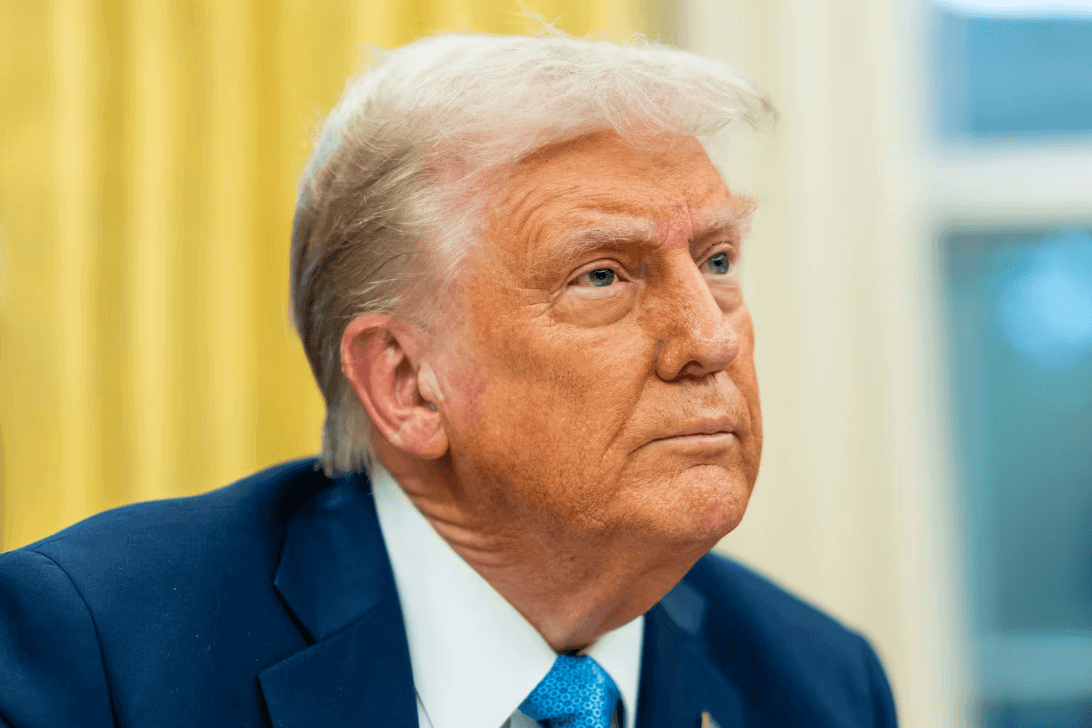特朗普关税威胁颠覆全球经济秩序

【中美创新时报2025 年 2 月 3 日编译讯】(记者温友平编译)本周末,唐纳德·特朗普总统对加拿大、墨西哥和中国征收全面关税的举动,威胁到全球贸易体系和世界经济秩序的瓦解,而这一秩序曾以重视开放投资和自由市场的美国经济为中心。《纽约时报》对此作了下述报道。
特朗普周六在行政命令中公布的进口关税速度和范围引发了许多立法者、经济学家和商业团体的广泛批评,他们抨击这些行动是经济失职。他们警告说,这些关税是为了回应特朗普对芬太尼走私和非法移民的担忧而征收的,可能会加剧通货膨胀、削弱美国工业,并使中国成为更强大的全球贸易中心。
特朗普周日为关税辩护,同时承认可能会产生一些负面影响。
“会有一些痛苦吗?是的,也许(也许不是!),”他在社交媒体上写道。
行政命令意味着,从周二凌晨 12:01 开始,所有从加拿大和墨西哥进口的商品都将被征收 25% 的关税,但加拿大能源产品除外,该类产品将面临 10% 的关税。所有中国商品也将面临 10% 的关税。

特朗普称,美国人可能会感受到他的新关税带来的“一些痛苦”
加拿大和墨西哥已誓言将迅速采取关税报复,中国表示将采取未指明的“反制措施”来维护其利益。
特朗普的高级贸易顾问彼得·纳瓦罗周日在 NewsNation 上表示,关税不太可能在最后一刻停止。
“这个特殊问题的严重性是巨大的,”纳瓦罗说,他指的是毒品进入美国并杀死美国人。 “是时候停止屠杀了。”
尽管特朗普的关税措施几个月来一直被明确传达,但其范围超出了许多分析师的预期。包括财政部长斯科特·贝森特在内的总统高级经济助理为使用关税进行了辩护,但表示应该将其作为谈判工具,或者应该逐步实施,以便企业有时间进行调整。
贝森特去年在致对冲基金 Key Square Group 合伙人的一封信中写道:“关税枪总是装好子弹放在桌子上,但很少开火。”
但特朗普毫不犹豫地将关税作为武器,对美国最大的贸易伙伴征收关税,从汽车零部件到鳄梨,应无所不包。
经济学家表示,贸易战升级的痛苦可能以经济增长放缓和物价上涨的形式出现。
“这些关税和其他未来措施导致的美国通胀激增将比我们最初预期的更快、更大,”凯投宏观北美高级经济学家保罗·阿什沃思表示。
特朗普正在利用一项很少部署的国家安全法,即《国际紧急经济权力法》,为对与美国有贸易协定的国家征收关税提供法律依据。
在他的第一个任期内,特朗普推动修改北美自由贸易协定,他曾批评该协定是有史以来“最糟糕的”贸易协定,并最终签署了《美国-墨西哥-加拿大协定》。他还与中国达成了一项贸易协议,要求北京从美国购买一定数量的产品。这些承诺尚未兑现。
特朗普征收关税的法律依据可能会在美国法庭上受到质疑。这还可能阻止其他国家与美国谈判贸易协定,因为他们担心总统可能会利用紧急权力任意废除这些协定。
“如果总统可以毫无理由地挥笔一挥,就彻底颠覆已经存在了 30 多年的北美供应链,那么为什么外国政府愿意花费所有政治资本来达成贸易协定?”支持自由贸易的卡托研究所经济与贸易副总裁斯科特·林西科姆说。
林西科姆补充说,美国给国际贸易蒙上阴影的不确定性只会让中国受益,共和党和民主党大多将中国视为经济对手。
特朗普威胁要对所有进口产品征收普遍关税,并对欧盟征收额外税款。这些举措可能会鼓励更多国家深化与中国的经济联系。虽然关税可能会给中国本已疲软的经济带来冲击,但美国供应链的中断以及特朗普放弃对清洁能源和电动汽车投资的计划最终可能会让这个世界第二大经济体受益。
约翰霍普金斯大学高级国际研究学院教授、前拜登政府工业政策经济学家乔纳斯·纳姆表示:“北京长期以来一直在寻找挑拨美国与其盟友关系的方法,对美国最亲密的伙伴征收关税使这变得容易得多。”
从理论上讲,国会可以试图采取行动推翻关税,但似乎没有采取这种努力的政治意愿。
民主党人也倾向于支持保护主义贸易措施,他们批评特朗普的行为是鲁莽的,但由于他们在国会中属于少数派,因此影响力不大。参议院少数党领袖、纽约州民主党人查克·舒默表示,“如果唐纳德·特朗普能开始专注于降低价格而不是提高价格,那就太好了。”
大多数共和党议员都保持沉默,或者似乎与特朗普站在同一阵线,而共和党议员传统上对关税问题深感担忧。少数持不同意见者中包括参议员兰德·保罗,来自肯塔基州。
“保守派曾经团结起来反对新税,”保罗在社交媒体上写道。“对贸易征税意味着贸易减少,价格上涨。”
内布拉斯加州众议员唐·培根代表去年卡玛拉·哈里斯获胜的选区,仍然是众议院中最脆弱的共和党人之一,他也对这项政策表示怀疑。他说,他对利用关税与加拿大谈判达成更好的贸易协议感到困惑。
“我们已经有一项贸易协定,这是一项很好的贸易协定,”他在 CNN 上说。“我很难解决这个问题。我们将在接下来的几周内看到影响,也许这是一个重新思考我们是否已经到了那个地步的机会。”
培根并没有直接批评特朗普,但他试图提供一些措辞谨慎的建议。“我建议把重点放在中国和俄罗斯,”他说。
一直在为关税做准备的主要行业团体的反击没有那么克制。美国的烈酒、汽车和农产品都是加拿大、墨西哥和中国报复的目标,报复性关税可能会对美国经济造成打击。
大型游说团体敦促特朗普政府考虑其他方式来解决边境和芬太尼问题,并警告称关税只会损害美国工人和企业。
“最终,制造商将首当其冲地受到这些关税的影响,削弱我们以有竞争力的价格销售产品的能力,并使美国的就业面临风险,”全国制造商协会主席兼首席执行官杰伊·蒂蒙斯说。
农业利益代表是特朗普第一任期内贸易战中受打击最严重的群体之一,他们周日警告称,特朗普让该行业陷入了“困境”。
“农场和牧场家庭响应号召,为美国家庭和世界提供粮食,而关税和报复将进一步给他们的生计带来压力,”美国农场主联合会主席 Zippy Duvall 表示。
本文最初发表于《纽约时报》。
题图:特朗普总统。ERIC LEE/NYT
附原英文报道:
Trump tariffs threaten to upend global economic order
By The New York TimesUpdated February 3, 2025
President Trump.ERIC LEE/NYT
WASHINGTON — President Donald Trump’s move this weekend to slap sweeping tariffs on Canada, Mexico and China is threatening to fracture the global trading system and a world economic order that once revolved around a U.S. economy that prized open investment and free markets.
The speed and scope of the import duties that Trump unveiled in executive orders Saturday prompted widespread criticism from many lawmakers, economists and business groups, who assailed the actions as economic malpractice. They warned that the tariffs, which were levied in response to Trump’s concerns about fentanyl smuggling and illegal immigration, could inflame inflation, cripple American industries and make China an even more powerful global trade hub.
Trump on Sunday defended the tariffs while acknowledging that there could be some negative consequences.
“WILL THERE BE SOME PAIN? YES, MAYBE (AND MAYBE NOT!),” he wrote on social media.
The executive orders mean that at 12:01 a.m. Tuesday, all goods imported from Canada and Mexico will be subject to a 25% tariff, except Canadian energy products, which will face a 10% tariff. All Chinese goods will also face a 10% tariff.
Trump says Americans could feel ‘some pain’ from his new tariffs
Canada and Mexico have vowed to retaliate swiftly with tariffs of their own, and China said it would pursue unspecified “countermeasures” to safeguard its interests.
Speaking on NewsNation on Sunday, Trump’s senior trade adviser, Peter Navarro, said it was unlikely that the tariffs would be stopped at the last minute.
“The magnitude of this particular problem is huge,” Navarro said, pointing to drugs entering the United States and killing Americans. “It’s time to stop the carnage.”
Although Trump’s tariffs were clearly telegraphed for months, they were broader than many analysts expected. The president’s top economic aides, including Treasury Secretary Scott Bessent, have defended the use of tariffs, but have suggested that they would be used as a tool for negotiations or that they should be phased in gradually to allow businesses time to adjust.
“The tariff gun will always be loaded and on the table but rarely discharged,” Bessent wrote in a letter to partners of his hedge fund Key Square Group last year.
But Trump did not hesitate to use tariffs as a weapon against America’s largest trading partners, imposing levies that will hit everything from auto parts to avocados.
Economists said the pain of an escalating trade war could come in the form of slower economic growth and higher prices.
“The resulting surge in U.S. inflation from these tariffs and other future measures is going to come even faster and be larger than we initially expected,” said Paul Ashworth, the senior economist for North America at Capital Economics.
Trump is using a rarely deployed national security law, known as the International Emergency Economic Powers Act, to legally justify imposing tariffs on countries that have trade agreements with the United States.
During his first term, Trump pushed for a rewrite of the North American Free Trade Agreement, which he had criticized as the “worst” trade deal ever, and ultimately signed the United States-Mexico-Canada Agreement. He also reached a trade deal with China that required Beijing to purchase a certain level of products from the United States. Those promises have not been met.
Trump’s legal rationale for the tariffs is likely to be challenged in U.S. courts. It could also dissuade other countries from negotiating trade pacts with the United States out of fear that the president could arbitrarily scrap them by using emergency powers.
“If the president can with the stroke of a pen and for no good reason completely upend a North American supply chain that has been in place for more than 30 years, why would a foreign government be willing to expend all the political capital needed to enter into a trade agreement?” said Scott Lincicome, vice president for economics and trade at the Cato Institute, which supports free trade.
Lincicome added that the cloud of uncertainty that the United States was casting over international commerce only stood to benefit China, which Republicans and Democrats largely view as an economic adversary.
Trump has threatened to impose a universal tariff on all imports, along with additional levies on the European Union. Those moves could encourage more countries to deepen economic ties with China. While the tariffs could sting China’s already soft economy, the disruption to U.S. supply chains and Trump’s plans to back away from investments in clean energy and electric vehicles could ultimately benefit the world’s second-largest economy.
“Beijing has long looked for ways to drive wedges between the United States and its allies, and tariffs on America’s closest partners make this much easier,” said Jonas Nahm, a professor at the Johns Hopkins School of Advanced International Studies and a former industrial policy economist in the Biden administration.
Congress, in theory, could try to take action to override the tariffs, but there does not appear to be the political will for such an effort.
Democrats, who also tend to embrace protectionist trade measures, criticized Trump’s actions as reckless but have little influence because they are in the minority in Congress. Senate Minority Leader Chuck Schumer, D-N.Y., said that “it would be nice if Donald Trump could start focusing on getting the prices down instead of making them go up.”
Most Republican lawmakers, who traditionally have deep concerns about tariffs, were silent or appeared to fall in line with Trump. Among the few dissenters was Sen. Rand Paul, R-Ky.
“Conservatives once united against new taxes,” Paul wrote on social media. “Taxing trade will mean less trade and higher prices.”
Rep. Don Bacon of Nebraska, who represents a district won by Kamala Harris last year and remains one of the most vulnerable Republicans in the House, also voiced skepticism of the policy. He said he was confused about using tariffs to negotiate a better trade deal with Canada.
“We already had a trade agreement and it was a good trade agreement,” he said on CNN. “It’s hard for me to square that circle. We’ll see what the impacts are over the next couple of weeks, maybe it’s a chance to maybe rethink we’re at that point.”
Bacon did not criticize Trump outright, but he tried to offer some carefully worded advice. “I would suggest focusing on China and Russia,” he said.
The pushback from major industry groups that have been bracing for the tariffs has been less restrained. U.S. spirits, cars and farm products are all ripe targets for retaliation from Canada, Mexico and China, and retaliatory tariffs could deal a blow to the U.S. economy.
Big lobbying groups urged the Trump administration to consider other ways to address border and fentanyl concerns and warned that tariffs would only harm American workers and businesses.
“Ultimately, manufacturers will bear the brunt of these tariffs, undermining our ability to sell our products at a competitive price and putting American jobs at risk,” said Jay Timmons, president and CEO of the National Association of Manufacturers.
Representatives for agricultural interests, which were among the hardest hit during the trade wars in Trump’s first term, warned Sunday that Trump had put the sector in a “tough spot.”
“Farm and ranch families answer the call to feed America’s families and the world, and the tariffs and promised retaliation will put further stress on their livelihoods,” said Zippy Duvall, president of the American Farm Bureau Federation.
This article originally appeared in The New York Times.

